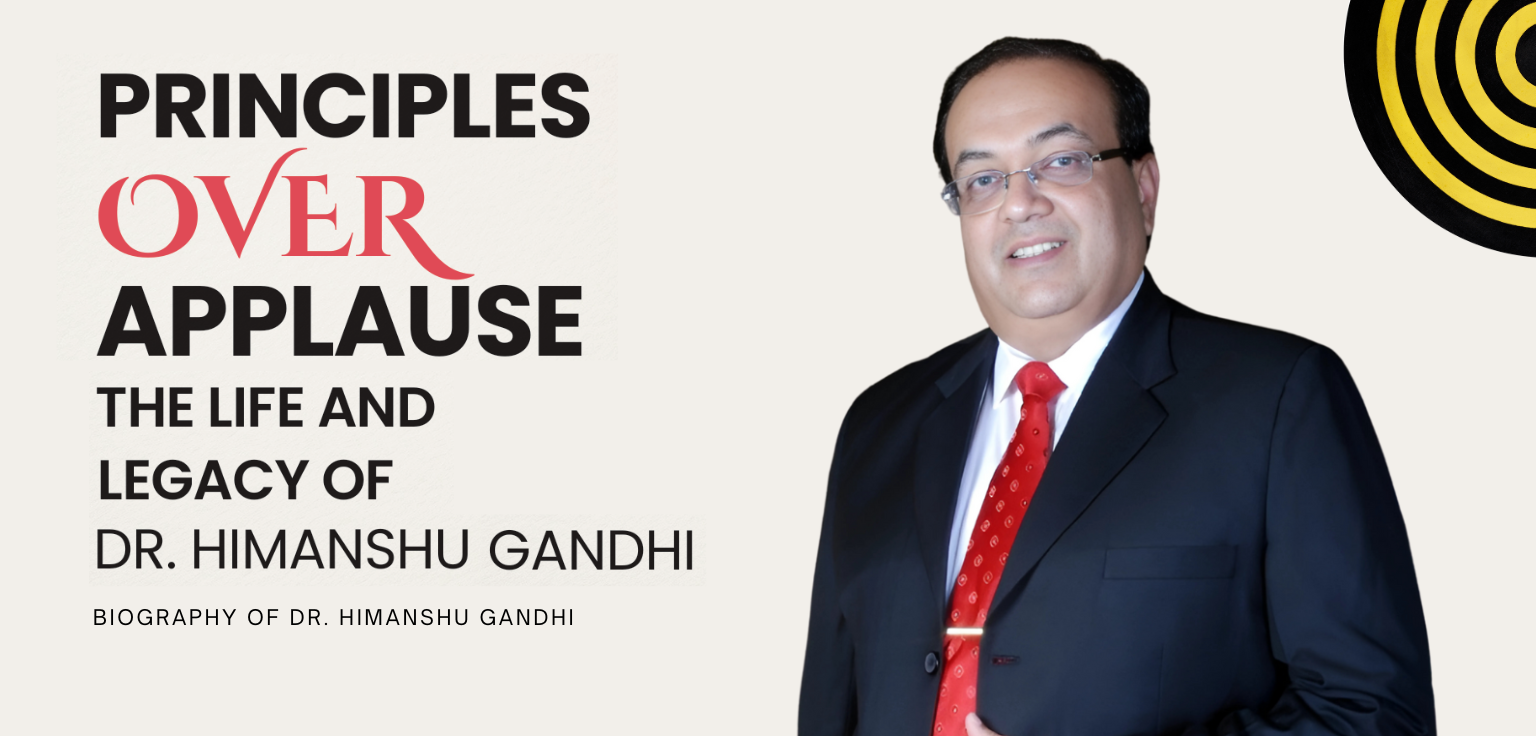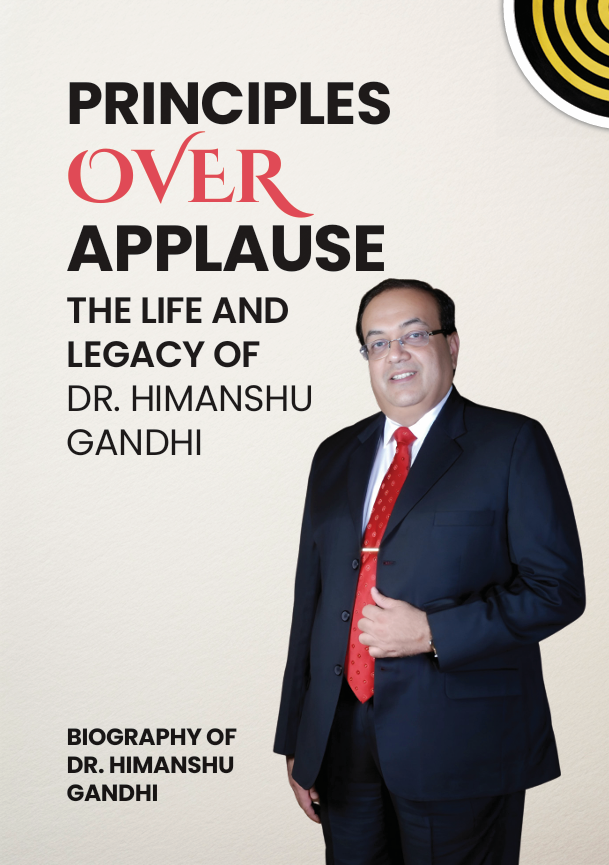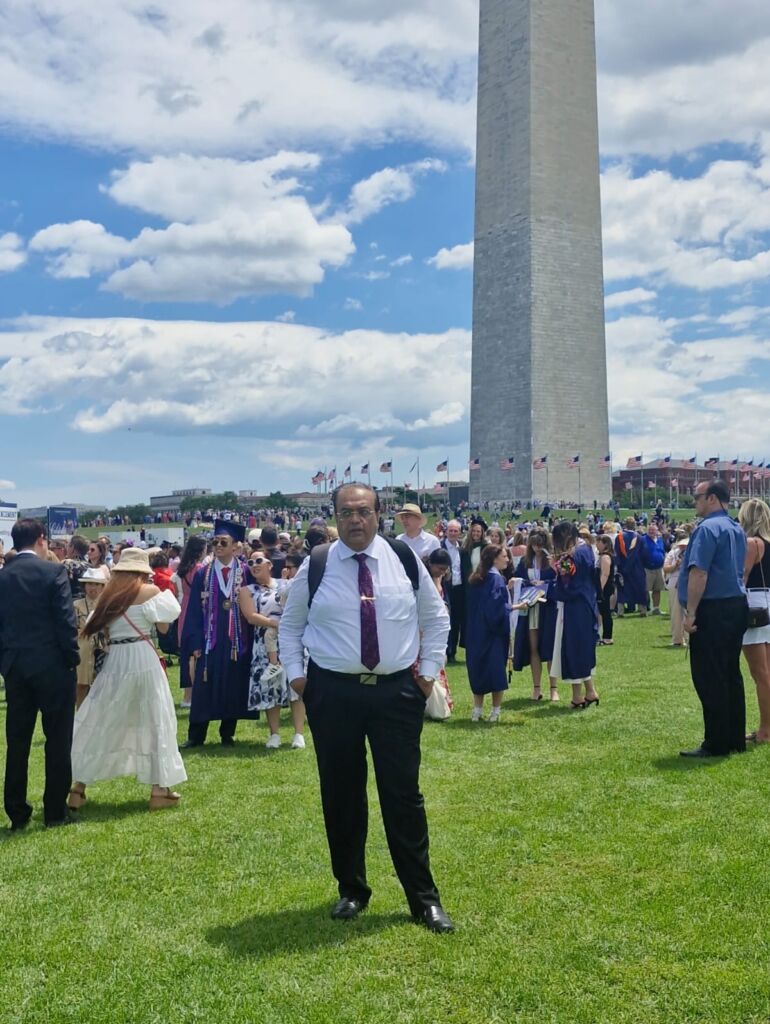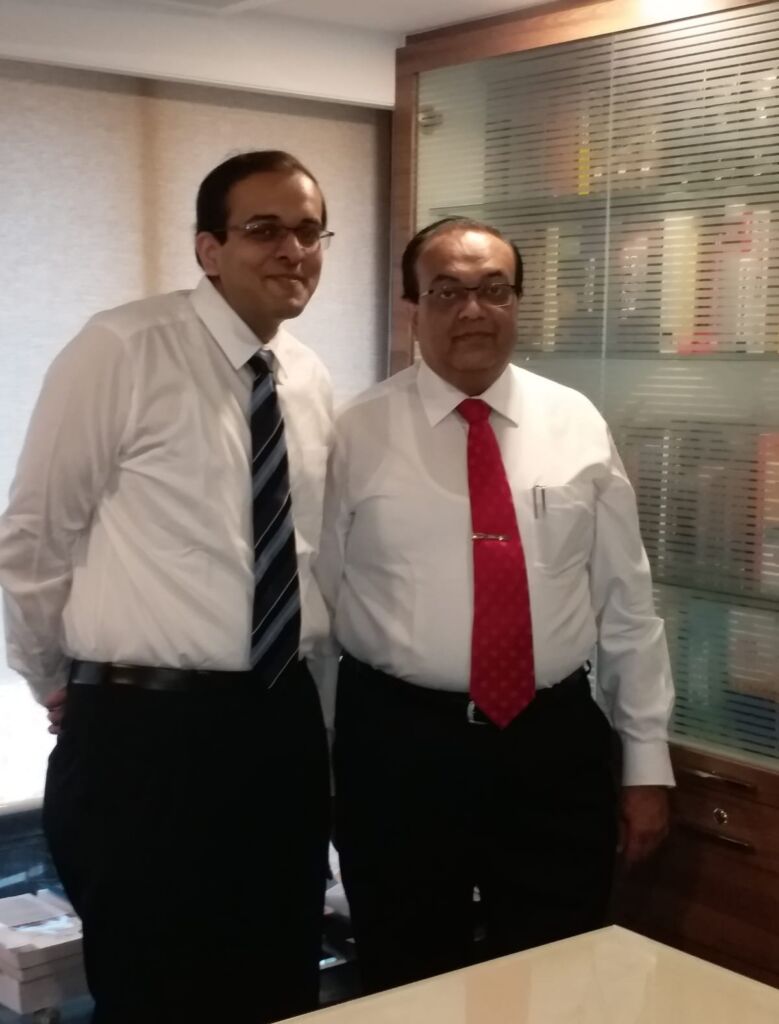

“We dared to be free, let us dare to be free by ourselves and for ourselves.” - Jean Jacques Dessalines
Introduction
“Success is not defined by how far one rises, but by how steadily one walks—rooted in values, guided by learning, and committed to serving beyond oneself.” — Dr. Himanshu Gandhi
Dr. Himanshu Ishwarlal Gandhi is a self-made entrepreneur, engineer, and legal consultant whose career spans more than three decades across industry, education, law, and community service. As the founder and proprietor of Meridian Exports, he has established a credible presence in the specialized domain of welding consumables—catering to high-priority sectors such as shipbuilding, power, aerospace, and infrastructure. His work bridges international product quality with domestic accessibility, offering high-performance materials to Indian industries at sustainable prices.
Born in a small village in Gujarat and raised in a modest, middle-class household, Dr. Gandhi’s journey reflects persistence over privilege. Educated in a vernacular-medium school, he went on to earn a Diploma in Mechanical Engineering, followed by a Bachelor’s Degree in Production Engineering from the University of Mumbai, where he was a gold medallist. Later, driven by a practical understanding of commerce and law, he pursued a Bachelor of Laws and a Master of Law with specializations in Business and Constitutional Law. In addition, he has undertaken certifications in intellectual property, arbitration, taxation, international human rights, and technical disciplines such as corrosion control and welding technology.
Rather than follow a conventional career route, Dr. Gandhi chose to venture into entrepreneurship with limited capital but strong conviction. He identified a niche in welding consumables, especially in the import of specialized products not manufactured in India. Over time, his knowledge-driven approach earned the trust of international manufacturers and Indian clients alike. Today, his business continues to contribute to projects of national significance while maintaining a focus on long-term stability, not just year-on-year financial performance.
Parallel to his commercial work, Dr. Gandhi has committed himself to community-oriented legal service, offering pro bono consultancy to individuals and nonprofits in matters such as insurance disputes, statutory benefits, real estate documentation, and income tax appeals. He is especially known for guiding underprivileged groups—students, patients, families, and small businesses—through legal and regulatory hurdles with clarity and compassion.
An active supporter of MSMEs and startups, he shares his knowledge in practical ways: through mentorship, legal literacy, and advisory support. His engagements include motivating high-school dropouts through skill-based training, speaking at colleges on entrepreneurship, and supporting scholars and charitable trusts in navigating compliance frameworks.
Dr. Gandhi’s belief in intergenerational impact drives his philosophy. He maintains that true growth is not defined by temporary expansion but by sustainability that can withstand time and change. His approach to business is guided not by quarterly returns, but by principles that ensure value is created and preserved across generations.
In essence, Dr. Himanshu Gandhi’s life reflects an uncommon blend of industry expertise, legal acumen, and social awareness. His path offers a quiet reminder that discipline, service, and knowledge—applied consistently over time—can build a life of both purpose and contribution, even without spotlight or fanfare.
PHASE 1 The Roots of Life
“I never aimed to be extraordinary; I simply tried to do each ordinary thing with quiet consistency.” — Dr. Himanshu Gandhi
Dr. Himanshu Gandhi was born in the year 1965 in a small, unassuming village in Gujarat, India. His arrival into a modest, middle-class household marked the beginning of a life that would be shaped not by extravagance or advantage, but by discipline, perseverance, and quiet responsibility. He was the only child of his parents, Mr. Ishwarlal P. Gandhi and Mrs. JyotiBen I. Gandhi — a simple and sincere couple who instilled in him the values of integrity, contentment, and self-reliance from an early age.
The environment of his early childhood was rooted in the slower rhythms of village life. There were no grand ambitions circling around him, no particular expectations beyond the ordinary aspirations of a family that believed in decency and dignity. His upbringing was steady and undramatic — defined more by daily routine and unspoken responsibility than any early flashes of distinction.
From his earliest school years, Dr. Himanshu Gandhi studied in the vernacular medium, learning through Gujarati. While others might have viewed this as a limitation in the long run, for him, it was simply part of the structure he had. He adapted to his circumstances without complaint. It would be fair to say that, during these formative years, he did not stand apart from his peers by any outward markers, but rather began forming a quiet internal discipline that would guide him in years to come.
The transition from his village to Mumbai was a turning point — not one of instant transformation, but a slow, steady shift into a broader and more complex world. Mumbai presented challenges that were very different from rural life: its scale, its pace, its diversity. Yet, Dr. Himanshu Gandhi approached these changes with a calm, observant resilience. The city did not dazzle him, nor did it intimidate him. He simply moved forward, step by step, adjusting, learning, and holding on to the core values of his upbringing.
What marked his early life was not any singular event, but a consistent way of being — a sense of doing things properly, quietly, and without fuss. There was no pursuit of the extraordinary, only an honest effort to do well with what was at hand. As a student, he did not aim to outshine others, but neither did he fall behind. He maintained a steady pace, one that reflected a natural discipline and a thoughtful temperament.
In many ways, these early years — spent first in the quiet of rural Gujarat and later in the crowded lanes of Mumbai — shaped the foundation of his character. There were no shortcuts, no moments of external recognition, but there was growth, understanding, and a gradually forming resolve. Looking back, Dr. Himanshu Gandhi’s early life may appear unremarkable on the surface. But within its simplicity lay the beginnings of a life that would value steadiness over speed, authenticity over acclaim, and commitment over cleverness — traits that would carry forward into every phase of his journey.
PHASE 2 The Journey of Education
“Learning, for me, was never about speed or spectacle — it was about understanding things well enough to be useful when it matters.” — Dr. Himanshu Gandhi

The academic journey of Dr. Himanshu Gandhi has been defined by thoughtful progression rather than haste, by depth rather than volume, and by relevance over recognition. His approach to learning has always been pragmatic — not driven by a desire for academic accolades, but by the steady pursuit of useful knowledge that can translate into practical value across multiple fields.
Dr. Gandhi began his formal education in the technical domain, earning a Diploma in Mechanical Engineering from the Board of Technical Examinations, Maharashtra State. This was a natural starting point for someone grounded in problem-solving and hands-on processes, and it gave him a strong foundation in the mechanical systems that underpin industrial practice. Building on this, he went on to complete his Bachelor of Engineering in Production Engineering from the University of Bombay in 1987. During these years, his learning was focused, application-oriented, and designed to equip him for a career in engineering and industry.
However, Dr. Gandhi’s intellectual interests were never static. With time and professional experience, his curiosity expanded beyond the realm of machines and processes into the systems that govern businesses and societies. This led him to re-enter formal education years later and pursue a Bachelor of Laws (LL.B.) from the University of Mumbai, which he completed in 2012. The transition from engineering to law was not an abrupt shift but a natural extension of his desire to understand organizational structures, compliance, and justice from a legal perspective.
This legal orientation deepened with a Master of Law (LL.M.), where he explored a variety of complex subjects including Business Law, Constitutional Law, Law and Medicine, and Criminology. Each of these fields connected in some way to his broader interdisciplinary interests.
Business Law aligned with his practical experience in industry and enterprise, while Constitutional Law gave him insights into the broader legal and political frameworks that shape civic life. The study of Law and Medicine and Criminology added a humanistic layer to his understanding, reflecting his willingness to engage with ethical and societal questions beyond commerce and compliance.
Complementing his formal degrees, Dr. Gandhi has also undertaken a wide array of certificate and professional courses, each chosen with a specific practical purpose. In the area of intellectual property, he completed a certification in Intellectual Property Rights from Narsee Monjee Institute of Management Studies in 2013, a natural intersection of his legal and technical backgrounds. His interest in dispute resolution led him to complete a Course in Arbitration conducted by the Indian Merchants Chamber in 2008, providing him with tools to address commercial disagreements in a structured, lawful manner. Recognizing the growing importance of digital risk and regulation, he enrolled in a Certificate Course on Cyber Crime and Cyber Laws offered by the National Law School of India University, Bengaluru, in 2015. This was further enhanced by his studies in Cyber Security, Digital Forensics, and Contract Law, all of which built his ability to navigate the evolving intersections of technology and law. He also pursued courses on International Human Rights, giving his legal framework a broader, globally-informed context.
In addition to legal studies, Dr. Gandhi invested in commercial and financial education, particularly relevant to his advisory work with MSMEs and startups. He completed targeted programs in Valuation of Companies, Transfer Pricing, and Financial and Compliance Audits, thereby equipping himself to interpret financial data and regulatory requirements in ways that support long-term business planning. These courses enabled him to guide organizations through increasingly complex economic landscapes.
PHASE 3 Professional Life
“I never rushed to grow fast — I focused on growing right. When knowledge leads and integrity stays constant, results will follow in their own time.” — Dr. Himanshu Gandhi

Dr. Himanshu Gandhi’s professional life did not begin with a large investment, a family business inheritance, or a high profile job offer. Instead, it started with a quiet decision: to create his own path—practical, self-driven, and rooted in both knowledge and adaptability. After completing his engineering degree in Production Engineering, he harboured a clear ambition: to establish his own business. More specifically, he was drawn toward international trade, with a particular interest in the field of import and export.
However, transitioning into entrepreneurship without significant capital or infrastructure required flexibility and resilience. To support his livelihood while building the foundation of his business vision, he enrolled in cost accountancy classes in the morning and simultaneously pursued law in the evening.
This dual track allowed him not only to gain further knowledge in two critical domains—finance and law—but also to earn a modest income while setting the stage for his entrepreneurial efforts.
At that time, production engineering graduates typically secured shift-based jobs in industrial sectors. However, Dr. Gandhi consciously opted not to enter that routine path. Instead, in 1987, he began his entrepreneurial career by entering the welding consumables market—an area that aligned closely with his technical background. He started on a small scale, engaging in the trade of specialized welding materials that were not widely available in India. These consumables were often required in industries where precision, safety, and quality were paramount, and many of them had to be imported from abroad.
His idea was relatively simple: to identify high-quality welding consumables that were not yet manufactured in India, import them, and provide them to Indian industries where such needs were growing. Over time, this small operation began to gain traction. Without significant financial backing, he worked gradually—establishing relationships, understanding market gaps, and maintaining consistency in delivery and service. Eventually, within a decade, he was able to set up his own modest office space. This marked a slow but solid turning point in his professional story.